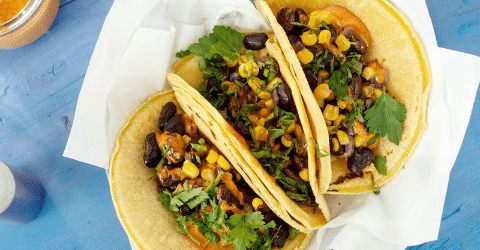Promoting A Plant-Based Diet Through Culturally-Appropriate Foods
My mother spent the first ten years of her life on the tiny island of Grenada before migrating to Trinidad and Tobago, where I was born and raised. Grenada in the mid-30s and 40s had none of the concrete jungles that exist today for the enjoyment of tourists. Instead, there were lush rainforests and communities that experienced a direct connection to, and appreciation for, the land. Village life was simple, and fresh food was abundant. My mother told me stories of never having to go hungry, and she recalled happy memories from as early as age eight—memories of climbing the mango trees and eating right there, feet dangling over the branches, until she was full. She would walk through my great grandfather’s garden, picking and eating large fresh cucumbers, sweet tomatoes, and whatever else was in season. My family lived on acres of precious family land that was shared with aunts, uncles, and cousins.
With the exception of imported rice and wheat, all of the food my mom ate was local, seasonal, organic, and fresh. There was an abundance of traditional Caribbean foods: mangoes, papayas, plantains, cassava, breadfruit, eddoe, coconut, corn, pigeon peas, black-eyed peas, cashews, green leafy vegetables, peppers, herbs, nutmeg and cinnamon. Animal products were only eaten occasionally and on special occasions, such as Christmas and weddings. When I asked my mother if she remembered the time when people began to eat more meat, she paused and thought for a bit before answering: “You know, it was when everybody bought a fridge.”
This was in the late 1950s. The refrigerator allowed people to store animal products. Transportation systems allowed people access to products that traveled across continents, and the marketing campaigns of multinational food corporations, backed by their corporate-funded research, convinced the public, including health care practitioners, that animal-based diets were necessary for optimal health.
Today, Caribbean diets are much more animal-based, with more meat from factory farms and more cheap imported junk food. And as we know, this shift has negatively affected human health, animal welfare, and even the interconnected balance that allows Mother Earth to thrive.
My own health story is a familiar one. In the early 2000s, I lived with gastric reflux, menstrual cramps, and knee pain. In 2009, I decided to switch to a whole food, plant-based (WFPB) diet to improve my health and reduce animal suffering. That experience was a conduit that changed my relationship with food. Within only 14 days, I had no more knee pain, cramps, or gastric reflux. I had more energy throughout the day, and I progressed from running three miles regularly to entering half marathon races. My increased energy levels and good health opened me up to a world of new possibilities that I’d never considered before.

The link between food and health couldn’t be clearer, and I wanted to learn more so that I could raise awareness about the benefits of a WFPB diet. Though I knew that talking about the benefits was helpful, the most convincing thing was when people could experience the difference themselves. So, I began educating myself. I read a lot of books, and recently, I completed the Center for Nutrition Studies’ (CNS) Plant-Based Nutrition Certificate program, which has been an asset to my work.
Just before the pandemic, I founded the nonprofit organization Rethink Your Food Inc to create pledge campaigns to encourage people of Caribbean heritage to rethink their relationship with what they think of as food. Through Rethink Your Food, I provide information about eating a plant-based diet and raise awareness about the negative impact that industrial animal agriculture has on farmed animals, our environment, and our health.
I believe that a single collective act can be a catalyst to transforming our food system. It is in this spirit that I launched my first campaign, the 21-day Vegan Caribbean Kickstart pledge program, with the support of CNS’s community grant initiative and other generous supporters. The kickstart includes an email series, a 3-week sample meal plan, and over 90 accompanying recipes. After the 21 days, participants can pledge to continue their journey for an additional six months with additional email support. I developed, tested, and wrote all of the recipes. The ingredients are culturally appropriate and made from whole plant foods.
Vegancaribbeankickstart.com is a helpful tool that can enable people to make better food choices and help build a movement while celebrating our Caribbean food culture. Over 4,500 people registered within the first four months. Eighty-five percent of the participants identified as people of Caribbean heritage, and over 90 percent stated that they were on an animal-based diet upon registering. New people are participating in the kickstart every day. I am grateful for the support of CNS’s community grant initiative—and so grateful to everyone who has contributed to that grant initiative—because they helped to make this project possible.
Similar to many people during that time when diets in the Caribbean were shifting, my mother fell in line with the status quo as society moved toward a more animal-based diet. That came with high blood pressure and the medication to manage it. After I switched to a plant-based diet, my mother decided to go back to the eating habits of her childhood, but this time as fully plant-based. Now she’s in her mid-80s and she takes no medication. Mom is very active in her garden; she walks as upright as any young adult and has the most optimistic attitude.
I currently live in Florida, home to the largest Caribbean population in the US, and my mother lives in Trinidad, so our time together is always a treasure. It is a gift to be able to enjoy conversations with her about what we eat, and it is a gift to have the opportunity to introduce people to the benefits of eating plant-based food.
